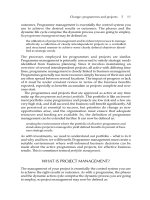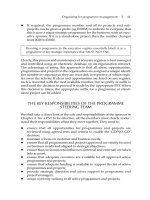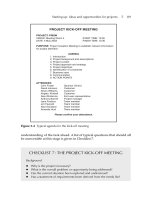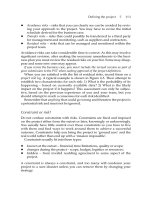50 little things that make a big difference to team motivation and leadership phần 1 potx
Bạn đang xem bản rút gọn của tài liệu. Xem và tải ngay bản đầy đủ của tài liệu tại đây (769.98 KB, 13 trang )
THE
BIZ
Biz Prelims 3/8/04 7:58 PM Page i
Biz Prelims 3/8/04 7:58 PM Page ii
THE
BIZ
50 little things that make a
big difference to
team motivation and
leadership
DAVID FREEMANTLE
N ICHOLAS B REALEY
P UBLISHING
LONDON BOSTON
Biz Prelims 3/8/04 7:58 PM Page iii
First published by
Nicholas Brealey Publishing in 2004
3–5 Spafield Street 100 City Hall Plaza, Suite 501
Clerkenwell, London Boston
EC1R 4QB, UK MA 02108, USA
Tel: +44 (0)20 7239 0360 Tel: (888) BREALEY
Fax: +44 (0)20 7239 0370 Fax: (617) 523 3708
© David Freemantle 2004
The right of David Freemantle to be identified as the author of this
work has been asserted in accordance with the Copyright, Designs and
Patents Act 1988.
ISBN 1-85788-346-2
British Library Cataloguing in Publication Data
A catalogue record for this book is available from the
British Library.
All rights reserved. No part of this publication may be reproduced,
stored in a retrieval system, or transmitted, in any form or by any
means, electronic, mechanical, photocopying, recording and/or
otherwise without the prior written permission of the publishers. This
book may not be lent, resold, hired out or otherwise disposed of by
way of trade in any form, binding or cover other than that in which it is
published, without the prior consent of the publishers.
Printed in Finland by WS Bookwell.
Biz Prelims 3/8/04 7:58 PM Page iv
Also by David Freemantle and published by
Nicholas Brealey:
The Buzz
50 little things that make a big difference
to delivering world-class customer service
and
What Customers Like About You
Adding emotional value for service excellence
and competitive advantage
Biz Prelims 3/8/04 7:58 PM Page v
CONTENTS
Acknowledgments viii
Introduction 1
THE PREMIER DIVISION 5
1 Make people your top priority 6
2 Be an exemplar 8
3 Give cause (aspire) 10
4 Hire the best 12
5 Fight to pay the best 14
6 Personalize relationships 16
7 Liberate people with trust 18
8 Communicate immediately 20
9 Initiate learning 22
10 Know what you want to be 24
11 Agree the contribution to be made 26
12 Measure what is important 28
THE MAGIC SEVEN 31
13 Disappear 32
14 Tell stories 34
15 Celebrate any success 36
16 Touch your team 38
17 Clean toilets, push trolleys, and serve customers 40
18 Inspire team members 42
19 Write, ring, and remember 44
SEVEN BIZ PERFORMERS 47
20 Take the lead in becoming the best 48
21 Create performance lines in your mind 50
22 Put yourself on the line 52
23 Work hard 54
24 Praise regularly and reprimand rarely 56
25 Be straight 58
26 Fire poor performers 60
Biz Prelims 3/8/04 7:58 PM Page vi
BIZ TEAMS 63
27 Dignify team members 64
28 Cooperate and create a “yes” spirit 66
29 Identify motivations 68
30 Let people express themselves 70
31 Show team members you care 72
32 Minimize meetings 74
33 Minimize consultation 76
34 Stamp out bad behavior 78
IMPROVING THE BIZ 81
35 Teach yourself 82
36 Study team members like a book 84
37 Drop people in the deep end 86
38 Nurture 88
39 Send team members away 90
THE SIX BIZ MINDSETS 93
40 First mindset: People 94
41 Second mindset: Customers 96
42 Third mindset: Money 98
43 Fourth mindset: Positivity 100
44 Fifth mindset: 110% attitude 102
45 Sixth mindset: Go M.A.D. 104
THE FINAL FIVE 107
46 Be indiscreet 108
47 Look happy 110
48 Be unhappy from time to time 112
49 Experiment with new motivational stimuli 114
50 Retreat, relax, reflect, review, and recharge 116
Biz Prelims 3/8/04 7:58 PM Page vii
ACKNOWLEDGMENTS
Writing a book is rarely a smooth process in which a solitary author
produces a perfect typescript for automatic conversion into the perfect
book. More often the end product has been improved substantially as a
result of inputs from a number of team players who work behind the
scenes to advise, cajole, and encourage the author to make changes for
the better. It can be a difficult process and I must confess I am not the
easiest author to deal with in this connection. It is easy to give advice
but not to take it.
I thought I had written the perfect book until Nicholas Brealey, my
publisher whose patience I must have exhausted, came along and
struggled to convince me—the stubborn and difficult author—that the
book could be even better. On reflection, he was absolutely right. I am
duly indebted to Nicholas along with his excellent support team in the
form of Victoria Bullock, Angie Tainsh, and Sally Lansdell for their helpful
inputs and their forbearance in dealing with me.
My wife Mechi, as on many occasions previously, has been incredibly
supportive during my extended absences at home and abroad while I
researched and wrote this book (and its companion). She also made
many helpful suggestions with regard to the text. I am duly grateful.
However, the prime inspiration for this book comes from the many
“star performers” I have had the privilege of meeting around the world
over recent times. These range from employees who have excelled in
their performance at the front line to highly motivational chief
executives who have a “switched-on,” people-oriented and customer-
focused approach that delivers results. Many of these people are
mentioned by name in this book and I would like to thank each one of
them for their inspiration.
Biz Prelims 3/8/04 7:58 PM Page viii
INTRODUCTION
Doing the biz
“As a racing driver, I trained myself to deal with each corner at a time.
You can’t jump ahead. Everything is achieved by inches.”
Damon Hill, Formula One World Champion, 1996
The best team leaders do the biz. They make a difference. They
motivate their people to perform
exceptionally well and achieve the required
results on a daily basis as well as in the
longer term.
These bosses understand what the biz is
all about and so do their teams. They are
focused and they have flair. They have the
energy and they have the edge.
Furthermore, they have fun when they are
fighting hard to deliver the goods. That’s the
biz. It’s all about delivering and making things happen—for customers,
for team members, for the company, and of course for themselves.
The biz is not simply a matter of implementing grand strategies and
pursuing long-term visions. Nor does it involve intellectual debate about
the values to be applied in the way the organization is managed and
customers are handled.
The biz is a matter of daily operations, of the little things that the
best bosses do and think on a minute-by-minute basis that have such a
big impact on the teams they manage.
The best team leaders do the biz when they step through the door
at 8.00 a.m. on a Monday morning. That’s because they choose to step
through that door at 8.00 a.m. as opposed to 9.00 or 10.00. Every little
choice they make, even what time they start work, will be observed and
will have a big impact on the team’s motivation.
Thus the decision of what to do first—whether to pick up the
phone, check the email, read a newspaper, grab a coffee, go and see the
director, chat to the secretary, or walk around saying “Hi!” to every
team member and asking about their weekend—will have an impact.
Biz Prelims 3/8/04 7:58 PM Page 1
2
The worst bosses get these small behaviors wrong and the best bosses
excel at them. That’s the biz.
There is no theory behind the biz, any more than there can be a
theory behind marriage. So this book is not full of theory, let alone
grand stratagems. Instead, it is full of the little things that we can choose
to think and do that will make a big difference in the way we motivate
our teams.
One key premise
However, there is one premise that is important: motivated people
perform more effectively in delivering results than demotivated people.
This is almost a truism, but even so it is worth stating because it begs
the corollary that to achieve results a boss must concentrate on
motivation. It is amazing how many companies and managers ignore this
simple premise.
PUTTING PEOPLE FIRST
My first management job was as a Production Manager with the American chocolate manufacturer
Mars Ltd. It was then and still is an excellent company. I learnt many valuable management lessons at
Mars and one of them was that to excel in business you have to invest an inordinate amount of time,
energy, and effort in getting the people thing right. That principle has stayed with me throughout my
career, which included a post on the board of an airline. With the hindsight of wisdom and all my
experiences with a multitude of companies around the world, some good and some not so good, I still
believe in this principle. If you don’t focus your management energies on people, then they won’t focus
their energies on the company.
Despite the proliferation of personnel and HR departments (which
might be part of the problem), the Mars approach is rare. It is all too
common to visit companies and find demoralized people who moan
and groan about their big bad bosses. These employees don’t feel
valued and complain that their bosses walk all over them, demand too
much from them, and give too little in return. That is one reason an
increasing number of professional people have given up their careers
in large companies to go and live in the countryside, on lower
incomes, and take up new interests there. While most people accept
the premise that to be successful in management you must put people
first, it is all too clear from a growing number of reports and
newspaper cases that this rarely happens. In their pursuit of short-
Biz Prelims 3/8/04 7:58 PM Page 2
3
term profit, too many managers neglect the essential people factor in
the business equation.
Choosing positive behaviors
This means choosing positive behaviors and attitudes that will maximize
the chance of stimulating other people’s positive motivational choices.
Thus if your team leader shouts loudly at you and rebukes you when
something has gone wrong, you have a choice. You can choose to be
demotivated (by getting defensive and becoming negative) or you can
choose to be motivated (by learning the lessons and applying them).
Equally, the team leader has a choice too. He or she can choose not to
rebuke you and instead choose to counsel you. In doing so, he or she
chooses an attitude, whether it is to hurt you with a rebuke—hoping
that this will motivate you to learn—or to demonstrate some positive
support with the offer of counseling—thus also motivating you to learn.
All bosses make these minute-by-minute behavioral choices every day
and they can have a big impact on morale. When bosses make effective
choices they are doing the biz—they achieve the desired results because
the people in their teams are motivated to do so.
About this book
This book focuses on these choices, on the people factor and the biz
mindset. It highlights many of the little things a successful boss has to do.
It is aimed at any boss who needs to motivate other people on a daily
basis. This could be a team leader in a bank, a department manager in a
retail store, a middle manager in a government agency or a charity. It
could be a foreman on a building site or a supervisor in a call center. It
could be a manager working in IT or a graduate trainee aspiring to
promotion.
Confucius said, “A journey of a thousand miles starts with the first
step.” This book is about all the little steps necessary to do the biz.
I suggest you read this book a section a day, focusing each day on
one simple step (specified at the end of that section) that you can take
with respect to your behavior or attitude in doing the biz. Each of these
little behaviors and attitudes is easy to apply. By concentrating on one
such behavior or thought each day, you will begin to build up a
reputation as a great boss who motivates people and who actually does
the biz.
Biz Prelims 3/8/04 7:58 PM Page 3
4
The book can also be used for those invaluable half-hour team
sessions that many companies and their managers hold on a daily or
weekly basis. One idea is to put onto the agenda of each team session:
“Feedback—what can I do better as boss? For example, should I be
doing (more of) this type of thing…” (then referring to one section from
this book).
Another application that will prove helpful to in-house trainers is to
develop a series of training modules using selected sections from the
book.
Finally, as it is impossible to separate employee motivation from
customer motivation (the two go together), I suggest readers also dip
into the companion volume entitled The Buzz: 50 little things that make
a big difference to delivering world-class customer service.
I guarantee that if you practice the various steps specified in this
book on a daily basis, over a period of 10 weeks (50 working days),
then you will have such a motivated team of people that you will do the
biz and achieve the results you want for your organization.
Forward to the basics…!
Biz Prelims 3/8/04 7:58 PM Page 4









